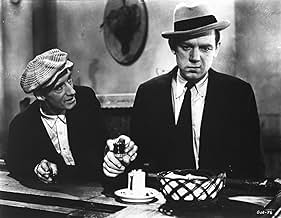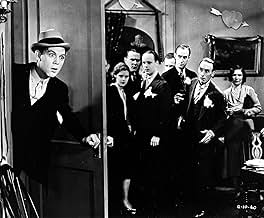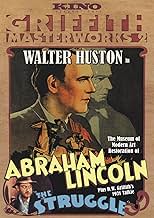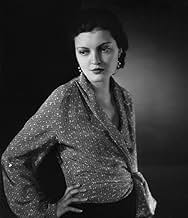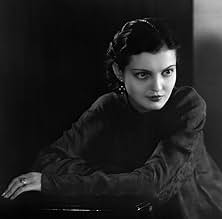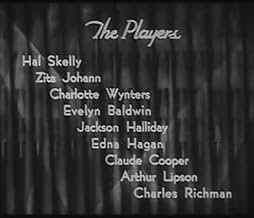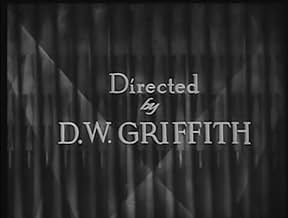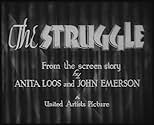Añade un argumento en tu idiomaA young couple's marriage is jeopardized by the husband's descent into alcoholism.A young couple's marriage is jeopardized by the husband's descent into alcoholism.A young couple's marriage is jeopardized by the husband's descent into alcoholism.
- Dirección
- Guión
- Reparto principal
Kate Bruce
- Granny
- (sin acreditar)
Tammany Young
- Barfly
- (sin acreditar)
Reseñas destacadas
Griffith's title of this movie lives up to what he must have gone through to get the movie made. It's a story that he could've easily made in the midst of the silent era circa 1913. It moves like his Biograph shorts, just with sound. Zita Johann is so 'Alice Joyce-like' in her performance that is the sympathetic-understanding wife type. Why doesn't she just take the daughter and leave Hal Skelly one would ask?
The later parts of the film pick up steam as opposed to the earlier parts. A group of children taunt Kelly in the street after his descent into alcoholism and loss of his job. Griffith meant to show the kids as cruel but they are more cute than malevolent. They are dressed like they are readying for a Little Rascals shoot. If you're acquainted with Griffiths numerous Biograph shorts, especially the preachy ones making moral statements, this film shows his return to this genre.
The later parts of the film pick up steam as opposed to the earlier parts. A group of children taunt Kelly in the street after his descent into alcoholism and loss of his job. Griffith meant to show the kids as cruel but they are more cute than malevolent. They are dressed like they are readying for a Little Rascals shoot. If you're acquainted with Griffiths numerous Biograph shorts, especially the preachy ones making moral statements, this film shows his return to this genre.
THE STRUGGLE (United Artists, 1931), directed by the legendary D.W. Griffith of such silent screen classics as THE BIRTH OF A NATION (1915), INTOLERANCE (1916), WAY DOWN EAST (1920), ORPHANS OF THE STORM (1921), takes the director's chair for the last time for his second talkie. Following his biographical all-talking success of ABRAHAM LINCOLN (1930) starring Walter Huston, Griffith's work for THE STRUGGLE turns out to be something more heavy-handled in regards to one man's struggle with alcoholism. Featuring a cast of unknowns rather than actors from the Griffith stock company of the past, the story is headed by stage performers of Hal Skelly, with some talkies to his credit, the best noted being THE DANCE OF LIFE (Paramount, 1929); and Zita Johann, better known to many for her performance opposite Boris Karloff in THE MUMMY (Universal, 1932), each doing their best in a scripted story by Anita Loos.
FORWARD: "This is a true narrative based on actual fact mirroring what is happening to thousands of families throughout the land. While 'The Struggle' is a powerful indictment of bootleg liquor emphasizing its devastating effect on American youth, it is not presented as a preachment either or against Prohibition. The picture, however, does raise these questions: If Prohibition is a success that people claim it is, how could all these things have happened? Is man's struggle against intemperance controllable by law, or is it solely a matter of individual characters." Prologue: 1911. Against the underscoring to "In the Good Old Summertime," couples are gathered together drinking and dancing at a beer garden, some discussing the current events of the day of movie actress, Mary Pickford, and of Ziegfeld Follies girl Peggy Joyce " getting married again." Move forward to 1923, where music has been jazzed up, and Prohibition and bootlegging liquor is in the news. Jimmy Wilson (Hal Skelly) is seen at a speakeasy socializing and boozing it up with the patrons. One of them in attendance is Florrie (Zita Johann), who not only loves Jimmy but wants him to stop drinking. They soon marry with Jimmy promising never to drink liquor again. Their marriage is blessed with a daughter, Mary (Edna Hagen), and Jimmy keeping true to his promise until he takes a drink again. His drunken appearance and obnoxious manner soon spoils the engagement party for his sister, Nan (Evelyn Baldwin) to Johnnie Marshall (Jackson Halliday), which finds him fired by his employer, Mr. Craig (Charles Richman), also a guest at the event. Jimmy's boozing puts a strain of his marriage, especially after his involvement with Nan (Charlotte Wynters), a cabaret girl who, along with her boyfriend, wipes him out of his savings, leaving his family to lose their apartment. Jimmy becomes a homeless bum of the streets, followed by a series of other unforeseen circumstances.
While melodramatic themes about alcoholism might have worked better during the silent 1920s movie era reflecting upon the Prohibition era (or possibly the film noir realism style of the 1940s in the wake of Ray Milland's powerful Academy Award winning performance as an alcoholic in THE LOST WEEKEND (Paramount, 1945)), Griffith's THE STRUGGLE only became a notorious flop. Possibly the reason for its theatrical failure comes at the time of its release (being the peek of the Great Depression), or possibly how the movie itself being poorly constructed with a outdated acting style with script reflecting back to the silent movie days. While THE STRUGGLE did have some fresh new faces, so to speak, in the cast, its direction by Griffith must have seemed out of date for 1931 or ahead of its time by today's standards. The actors do what's expected pf them, but there's something lacking here to make this into a strong and powerful story. There have been other movies of this nature with depressing theme with realistic and unpleasant motivations that have proven successful, THE STRUGGLE. however, didn't garner any Academy Award nominations and the success of THE LOST WEEKEND.
Unseen for decades probably due to its reputation, to date, THE STRUGGLE has never been shown on television, except for clips on the film on documentaries on D.W. Griffith. A struggle for some, a curiosity for others, THE STRUGGLE is of notability today solely on the D.W. Griffith name attached to it, especially for movie scholars and fans of the director's work. This 76 minute feature film production has become available for rediscovering on DVD from Kino Video with Griffiths ABRAHAM LINCOLN on its flip-side. (*1/2)
FORWARD: "This is a true narrative based on actual fact mirroring what is happening to thousands of families throughout the land. While 'The Struggle' is a powerful indictment of bootleg liquor emphasizing its devastating effect on American youth, it is not presented as a preachment either or against Prohibition. The picture, however, does raise these questions: If Prohibition is a success that people claim it is, how could all these things have happened? Is man's struggle against intemperance controllable by law, or is it solely a matter of individual characters." Prologue: 1911. Against the underscoring to "In the Good Old Summertime," couples are gathered together drinking and dancing at a beer garden, some discussing the current events of the day of movie actress, Mary Pickford, and of Ziegfeld Follies girl Peggy Joyce " getting married again." Move forward to 1923, where music has been jazzed up, and Prohibition and bootlegging liquor is in the news. Jimmy Wilson (Hal Skelly) is seen at a speakeasy socializing and boozing it up with the patrons. One of them in attendance is Florrie (Zita Johann), who not only loves Jimmy but wants him to stop drinking. They soon marry with Jimmy promising never to drink liquor again. Their marriage is blessed with a daughter, Mary (Edna Hagen), and Jimmy keeping true to his promise until he takes a drink again. His drunken appearance and obnoxious manner soon spoils the engagement party for his sister, Nan (Evelyn Baldwin) to Johnnie Marshall (Jackson Halliday), which finds him fired by his employer, Mr. Craig (Charles Richman), also a guest at the event. Jimmy's boozing puts a strain of his marriage, especially after his involvement with Nan (Charlotte Wynters), a cabaret girl who, along with her boyfriend, wipes him out of his savings, leaving his family to lose their apartment. Jimmy becomes a homeless bum of the streets, followed by a series of other unforeseen circumstances.
While melodramatic themes about alcoholism might have worked better during the silent 1920s movie era reflecting upon the Prohibition era (or possibly the film noir realism style of the 1940s in the wake of Ray Milland's powerful Academy Award winning performance as an alcoholic in THE LOST WEEKEND (Paramount, 1945)), Griffith's THE STRUGGLE only became a notorious flop. Possibly the reason for its theatrical failure comes at the time of its release (being the peek of the Great Depression), or possibly how the movie itself being poorly constructed with a outdated acting style with script reflecting back to the silent movie days. While THE STRUGGLE did have some fresh new faces, so to speak, in the cast, its direction by Griffith must have seemed out of date for 1931 or ahead of its time by today's standards. The actors do what's expected pf them, but there's something lacking here to make this into a strong and powerful story. There have been other movies of this nature with depressing theme with realistic and unpleasant motivations that have proven successful, THE STRUGGLE. however, didn't garner any Academy Award nominations and the success of THE LOST WEEKEND.
Unseen for decades probably due to its reputation, to date, THE STRUGGLE has never been shown on television, except for clips on the film on documentaries on D.W. Griffith. A struggle for some, a curiosity for others, THE STRUGGLE is of notability today solely on the D.W. Griffith name attached to it, especially for movie scholars and fans of the director's work. This 76 minute feature film production has become available for rediscovering on DVD from Kino Video with Griffiths ABRAHAM LINCOLN on its flip-side. (*1/2)
I hesitated for some time before seeing "The Struggle" because it was considered by most critics to be a pathetic boring mess done by a broken man. I knew it was Griffith's final film and I didn't want to see this great master produce a terrible film at the end of his career. When I finally did view it I found that a film that is full of passion, new ideas and bold innovative strokes.
There are several innovations in the use of sound. At the time actors were careful to talk one after the other because it was thought that people talking at the same time would be too confusing for the audience. Griffith used overlapping dialog and a party scene with multiple background sounds of music and talking as well as dialog. This sounded far more natural. Also at this time actors were being told to use artificial elocution and diction when speaking on screen. They usually sounded either foreign or very upper crust. Griffith had his actors use natural accents. Hal Skelly and Zita Johnson sound like normal people who talk fast use slang and sometimes slur their words.
The most impressive innovation was in Griffith's development of the plot. The story of a man who sinks into alcoholism could and would normally be treated as a moral lesson against the evils of drink. In Griffith's hands it is personal tragedy that has to do with the strength's and weakness of the individuals involved. Jimmy becomes an alcoholic because of his own personality traits and whatever redemption he achieves is due to the strength of his love for his wife and his daughter. There is no preaching here. Griffith had done a similar film called "Isn't Life Wonderful" in Germany which influenced German filmmakers particularly Pabst in his "Joyless Street." "Joyless Street" is innovative in it's own right but it is clear where its inspiration comes from when whole sections of it are lifted from "Isn't Life Wonderful".
"The Struggle" was a financial failure. Without enough personal funds and without the confidence of any backers, Griffith would never make another film. He had lost touch with his audience. Caught in the middle of the Great Depression, American audiences wanted a moral lesson so they could fix blame, or pure escapism. The last thing they wanted was a complex personal drama to remind them of their own complex personal problems. It would be a long time before films like this would be made in America. But although Griffith had lost his audience, enough creative artists must have seen and been influenced by this film, because starting with films like Citizen Kane, we began to see films about difficult problems treated as stories that were personal to the characters involved and not as moral lessons.
There are several innovations in the use of sound. At the time actors were careful to talk one after the other because it was thought that people talking at the same time would be too confusing for the audience. Griffith used overlapping dialog and a party scene with multiple background sounds of music and talking as well as dialog. This sounded far more natural. Also at this time actors were being told to use artificial elocution and diction when speaking on screen. They usually sounded either foreign or very upper crust. Griffith had his actors use natural accents. Hal Skelly and Zita Johnson sound like normal people who talk fast use slang and sometimes slur their words.
The most impressive innovation was in Griffith's development of the plot. The story of a man who sinks into alcoholism could and would normally be treated as a moral lesson against the evils of drink. In Griffith's hands it is personal tragedy that has to do with the strength's and weakness of the individuals involved. Jimmy becomes an alcoholic because of his own personality traits and whatever redemption he achieves is due to the strength of his love for his wife and his daughter. There is no preaching here. Griffith had done a similar film called "Isn't Life Wonderful" in Germany which influenced German filmmakers particularly Pabst in his "Joyless Street." "Joyless Street" is innovative in it's own right but it is clear where its inspiration comes from when whole sections of it are lifted from "Isn't Life Wonderful".
"The Struggle" was a financial failure. Without enough personal funds and without the confidence of any backers, Griffith would never make another film. He had lost touch with his audience. Caught in the middle of the Great Depression, American audiences wanted a moral lesson so they could fix blame, or pure escapism. The last thing they wanted was a complex personal drama to remind them of their own complex personal problems. It would be a long time before films like this would be made in America. But although Griffith had lost his audience, enough creative artists must have seen and been influenced by this film, because starting with films like Citizen Kane, we began to see films about difficult problems treated as stories that were personal to the characters involved and not as moral lessons.
I'm glad to see that the previous comments have been charitable. It's interesting that Griffith was filming the same type of story back in 1909 at Biograph. There are several characteristic Griffith touches in this film -- for instance, the tenderness of the wife when her husband first comes home drunk to her, and in the penultimate scene at his bedside. I'm sorry this picture never had a general release because it is well worth seeing. Chaplin made a silent film as late as 1931; perhaps Griffith should have taken a chance and done that with "The Struggle," because it may have worked better as a silent. References are made to the early days of Griffith's career in the opening scenes of the film; 1911 would seem to have been more remote to a 1931 audience than, perhaps, 1987 seems to us today. A fascinating film.
It's no wonder that "The Struggle" flopped when released in late 1931. Even for that time it was considered stagey and out of date. When you consider that it was the work of veteran innovator D.W. Griffith it's all the more surprising that it is so humdrum in cinematic technique. It's about a factory worker (Hal Skelly) who struggles with alcohol addiction, gradually alienating his wife (Zita Johann) and daughter and sliding into impoverishment and dementia. Skelly is excellent as the drunk, as great a physical actor as he was in "The Dance of Life" a couple of years earlier. Johann seems uncomfortable. In general the direction of the actors, particularly the timing of their dialogue, is stiff. The scenes where Skelly hits rock bottom in a dark hovel are hideously effective but even the lighter scenes are dreary, taking place in drab apartments, barrooms and work places. The daily life of the characters as depicted in these scenes would drive anyone to drink.
¿Sabías que...?
- CuriosidadesThis was the final feature-length film directed by D.W. Griffith.
Selecciones populares
Inicia sesión para calificar y añadir a tu lista para recibir recomendaciones personalizadas
Detalles
- Fecha de lanzamiento
- País de origen
- Idioma
- Títulos en diferentes países
- Ten Nights in a Bar Room
- Localizaciones del rodaje
- Empresas productoras
- Ver más compañías en los créditos en IMDbPro
- Duración1 hora 27 minutos
- Color
- Relación de aspecto
- 1.20 : 1
Contribuir a esta página
Sugerir un cambio o añadir el contenido que falta

